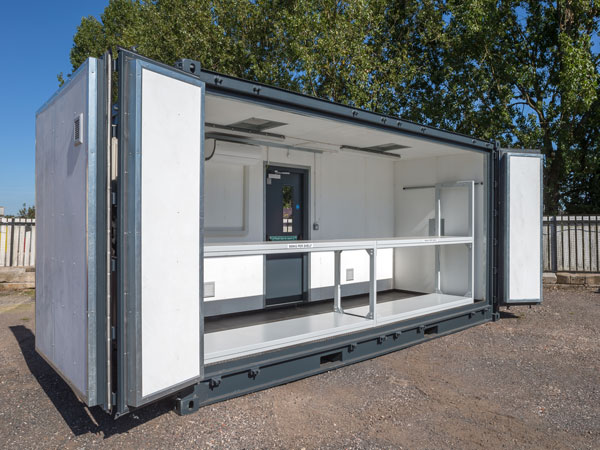Modern Methods of Construction (MMC) have been a hot topic for a number of years now.
However, one of the areas often over-looked is the humble container; a ready-made structure that, with the right modifications, can create the ideal workshop, office, retail unit, plant room, datacentre, or classroom. Here, conversion expert Andy Capella from S Jones Containers discusses the benefits of using containers, modular buildings, and some of their most popular applications.
Used correctly, containers can be one of the most versatile, durable, low impact and easily transportable building materials known to man. While high-end home designs tend to hit the headlines thanks to programmes like Grand Designs, there are a number of lesser-known practical applications that can help stimulate economic growth, expand classroom sizes and drive R&D.
Offices, workshops, and retail units
Self-contained, adaptable, low impact and zero maintenance are just a few of the reasons Staffordshire County Council recently specified 12 containers for a start-up development at Silverdale Enterprise Centre in Newcastle-under-Lyme. The county council operates a number of enterprise centres and workshop units across Staffordshire. Its earliest units date back to the early 1980s and have been a fundamental part of economic regeneration.
With high numbers of people furloughed, facing redundancy, or simply reassessing their options due to the Covid-19 pandemic, the council encountered unprecedented demand for new start up spaces. With all of the units at Silverdale Enterprise Centre at full occupancy, the county council opted to expand their available workshop units by installing specially modified containers in an unused part of the site’s car park. Finished to a high standard complete with insulation, electrical ports, and French doors, the units were modified offsite and delivered ready for use, minimising disruption caused by construction work for the local community. Built to last as long as 25 years, the new units are set to provide a secure space for more than 1000 start-up businesses over the coming decades, with the county council able to transport the units to meet demand across its estate.
It's not just offices and workshops containers are increasingly being specified for though. Flexibility and ease of transport is also making them a popular choice for retail. One of the most recent requests we’ve received is the development of a new unit for a business hiring out electric bikes. With containers requiring little to no groundwork, the unit can be transported into central London and moved in-line with consumer demand and footfall. Containers are often being specified for start up businesses as they represent a lower investment than bricks and mortar or a long-term lease and provide the business owners or investors with an asset that can be resold or redeployed as needed.
Schools, colleges, and universities
Modular buildings are another flexible space solution being used increasingly for commercial purposes. Unlike containers, modular buildings are configured to spec by combining individual cabin modules that can be extended and adapted at any time to meet customers’ needs, whether temporary or permanent.
For example, one of the major obstacles facing schools, colleges and universities right now is a lack of available teaching space. With major expansions costing millions of pounds and often taking months or even years to complete, the minimal on-site disruption, lower cost and rapid turnaround of modular buildings makes them an understandably popular choice for solving this problem.
As the name suggests, one of the key benefits of modular buildings is how versatile and extendable they are. Depending on the customer’s needs, the individual units can be connected seamlessly via wall panels and partitions to create large open plan spaces that are ideal for classrooms, offices and countless other applications. In fact, this modular style of building has proved so popular that there is now an off the shelf option that includes high-level insulation and fire safety ratings as standard. Through modular construction we can create spaces as large as 640 square foot and up to three stories high.
Industry and R&D
There are, however, some applications where a regular shipping container is a more suitable foundation to work from. One such area is high-level manufacturing, engineering and R&D which often require self-contained, off-site spaces within which plant processes and equipment testing can safely and compliantly occur.
For instance, there's been a huge surge in demand for lithium-ion battery manufacture and storage sites, in line with advancements in technology. Secure, transportable and endlessly customisable, shipping containers are increasingly being used as the spaces within which ground-breaking new technologies, processes are being created, tested and refined, and where high-value labs and machinery are being housed. Using 3D CAD, we’ve helped develop high-tech units that can be shipped to wherever they’re needed most all over the world. One of the advantages for industry is that containers are often a lot more robust that conventional temporary structure building materials. They're built to transport 20 to 50 tonnes, so to put heavy plant machinery in there is no problem at all.
Also ideal for site expansions, a container can quickly and effectively be modified to become boiler or compressor housing and where needed, attached to the existing building. Ultimately, using a container ensures that the machinery is safe, secure, and protected from the elements with little to no need for maintenance.
From sophisticated container conversions with complete with state-of-the-art fire suppression through to almost limitless flexibility of modular buildings, MMC are undoubtedly here to stay and are only going to grow in importance as emphasis increases on sustainability, reduced costs and low impact design. It’s perhaps ironic that an invention of the 1950s continues to act as the basis for many solutions to the issues created by our rapid rate of technological and cultural change in the 21st century, whether that be in advancements in renewable technologies and processes, increasing populations or changes to working and shopping habits. The original design principals of safety, security and durability remain the same, the only difference is that we can now apply them in many more ways than was originally intended.
Andy Capella is the conversions manager for S Jones Containers. To find out more about how containers can be used for offsite and modular construction visit www.sjonescontainers.co.uk/container-conversions, email sales@sjonescontainers.co.uk or call 01922 741 756.
Follow S Jones Containers on LinkedIn www.linkedin.com/company/s-jones-containers/.
Connect with Andy Capella www.linkedin.com/in/andrew-capella-92926596/.
Time and date
CONSTRUCTION DIRECTORY
Construction News
30/06/2022
Could Containers Be The Missing Jigsaw Piece For Commercial MMC?

Latest Construction News
15/11/2024
A significant redevelopment is underway at Royal Naval Air Station (RNAS) Culdrose, Cornwall, following a contract award to Kier and Mott MacDonald. The Defence Infrastructure Organisation (DIO) and the Royal Navy marked the occasion with a contract-signing and ground-breaking ceremony, ...
15/11/2024
JV North, a consortium of housing associations and local authorities, has unveiled a new £500 million procurement framework aimed at delivering over 3,000 affordable homes between 2025 and 2029. The initiative marks a significant boost for social housing and the construction sector. The ...
15/11/2024
Sempra Homes has announced funding approval for a new affordable housing project at Bowers Close on London Road, Pitsea. The development will deliver 31 high-quality homes, offering a mix of rental and shared ownership properties designed to address local housing needs. The project has received ...
15/11/2024
Vistry Group has received planning permission for the first phase of its Wolborough Grange development, which will deliver 94 high-quality homes. This milestone marks the beginning of a transformative project that will provide sustainable housing and significant community benefits in Newton ...
15/11/2024
Salisbury Coach Park and the main footpaths through the Central Car Park have reopened following an extensive transformation by the Environment Agency as part of the River Park scheme. The upgraded facilities aim to provide a more welcoming and comfortable experience for coach passengers visiting ...
15/11/2024
Pennyfarthing Homes has unveiled an exceptional collection of one- and two-bedroom apartments at Oakwood Grove, a modern development offering affordable homes through the Government-backed First Homes scheme, now available via Dorset Council. Located in the scenic rural village of Alderholt, ...
15/11/2024
Morris & Spottiswood Group has acquired part of the collapsed ISG group, offering a vital lifeline to the employees and projects operating within its remit. Absorbing the former ISG Cathedral business, Morris & Spottiswood Group, which is a specialist provider of fitout, refurbishment, M&E, ...
15/11/2024
Morgan Sindall Construction has officially commenced work on Rosherville Church of England Academy, a new primary school designed to address the educational needs of Northfleet’s expanding community. To commemorate the start of the project, a time capsule was ceremonially lowered into the ground, ...
15/11/2024
Vistry Group has exchanged contracts to develop over 200 mixed-tenure homes at Waggons Way, Doncaster. The 16-acre site, formerly part of the Hatfield Colliery, will be transformed into a vibrant new community featuring up to 236 high-quality homes. The proposed development will include homes ...
15/11/2024
The University of Sunderland has officially relaunched its newly refurbished cinema. The venue on St. Peter's Campus was damaged beyond use due to Storm Arwen in 2021, but now a £1.3m investment means it is back in action once again. To mark the occasion, Sir David Bell, the University’s ...

















